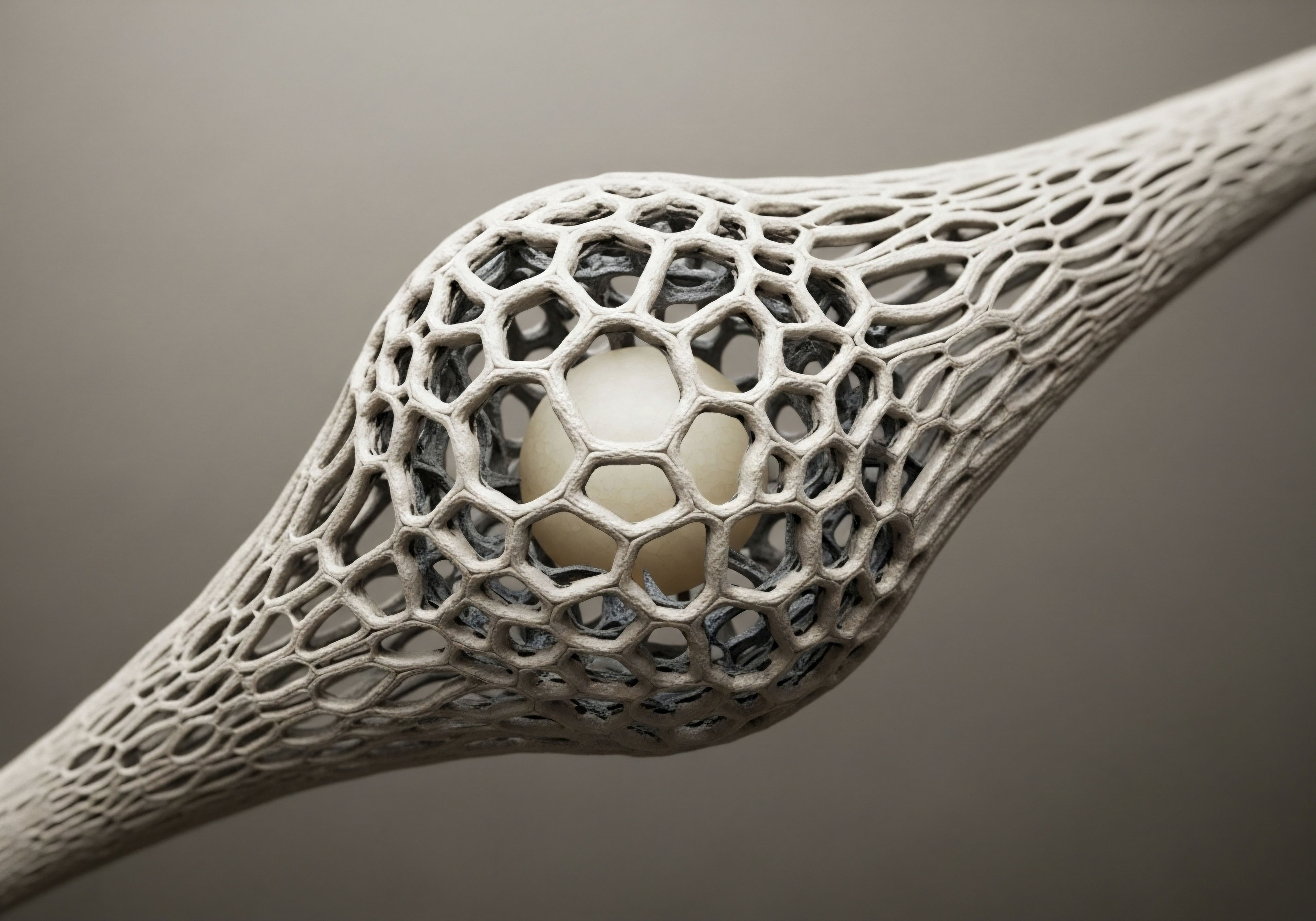

Fundamentals
The decision to begin a journey of hormonal optimization is deeply personal, often born from a quiet awareness that your internal world feels out of sync. You might be experiencing a persistent mental fog, a frustrating inability to recall information, or a general dimming of the intellectual sharpness you once took for granted.
These experiences are valid and real. They are biological signals from a body requesting support. When considering Testosterone Replacement Therapy (TRT) and its profound synergy with structured lifestyle modifications, the primary question becomes one of timeline. You want to know when you will feel like yourself again. The answer is a layered one, reflecting the intricate and progressive nature of biological recalibration.
Initial changes are often subtle, felt more as a lifting of a veil than a sudden cinematic reveal. Within the first few weeks, many individuals report an improvement in their quality of sleep. This foundational shift is significant. Restorative sleep is the bedrock upon which cognitive function is built.
As your sleep architecture improves, you may notice more energy and alertness during the day, making it easier to engage with complex tasks. This early phase is about setting the stage. Your brain, which has an extensive network of androgen receptors, is beginning to respond to the renewed availability of testosterone. The initial response is less about dramatic cognitive leaps and more about creating the right internal environment for those leaps to occur.
A commitment to both hormonal therapy and lifestyle adjustments creates a powerful biological synergy that accelerates cognitive recovery.
As you move into the first one to three months, the cognitive benefits begin to manifest more clearly. The “brain fog” that may have clouded your thinking starts to dissipate, replaced by enhanced mental clarity. This is a period where the direct effects of testosterone on neural processes become more apparent.
Testosterone influences synaptic plasticity, which is the ability of your brain’s signaling pathways to become more efficient. This increased efficiency translates into improved memory and verbal fluency, making it easier to learn, recall, and articulate information. You may find that words come more easily and that the frustration of searching for the right phrase begins to fade. This is a time of tangible progress, where the commitment to your health protocol starts to yield noticeable intellectual rewards.

The Role of Foundational Lifestyle Adjustments
It is impossible to separate the cognitive benefits of TRT from the profound impact of simultaneous lifestyle changes. Hormonal therapy provides the raw materials for cognitive improvement, but lifestyle adjustments build the structure. Engaging in regular physical activity, for instance, does more than build muscle; it enhances blood flow to the brain, delivering vital oxygen and nutrients that support the growth of new neural connections. Both endurance and strength training have been shown to improve brain function and cognitive performance.
Similarly, adopting a nutrient-dense diet, such as a Mediterranean-style eating plan, provides the essential building blocks for neurotransmitter production and reduces the systemic inflammation that can impair cognitive processes. These lifestyle factors work in concert with hormonal optimization, creating a powerful feedback loop where each positive change amplifies the others. The timeline for seeing cognitive benefits is a dynamic interplay between the direct action of testosterone and the supportive environment created by your daily choices.


Intermediate
Progressing beyond the initial phase of hormonal and lifestyle recalibration, the timeline for cognitive enhancement enters a more profound and sustained period of improvement. Between three to six months, the neurological and psychological benefits of optimized testosterone levels become increasingly robust and multifaceted.
This is the window where many individuals report a significant decrease in mental fatigue and a heightened capacity to manage challenging or stressful situations. The initial gains in mental clarity solidify into a more resilient and consistent state of cognitive function. This period is characterized by the consolidation of early improvements and the emergence of higher-order cognitive benefits.
The mechanisms at play are a direct result of testosterone’s influence on the central nervous system. Testosterone and its metabolites act on various brain regions, including the hippocampus and prefrontal cortex, which are central to memory, learning, and executive function.
By modulating neurotransmitter systems and promoting neurogenesis ∞ the creation of new neurons ∞ optimized testosterone levels support a more dynamic and adaptable brain environment. This biological process underpins the subjective experience of enhanced focus, improved concentration, and a greater ability to sustain mental effort throughout the day.

Detailed Timeline of Cognitive and Psychological Gains
To understand the progression, it is helpful to visualize the timeline of expected benefits. While individual responses will always vary based on baseline health, genetics, and adherence to protocols, a general framework can be established. This timeline illustrates how different aspects of cognitive and psychological well-being respond over several months.
The synergy between TRT and lifestyle is particularly evident during this phase. A structured exercise regimen, for example, not only supports the physical changes driven by testosterone but also independently boosts brain-derived neurotrophic factor (BDNF), a protein crucial for neuronal survival and growth. This creates a powerful combination where the hormonal environment is primed for growth and the lifestyle behaviors provide the stimulus for that growth to occur.
Sustained cognitive enhancement is achieved when hormonal optimization is paired with consistent, targeted lifestyle interventions that support neurological health.
What is the Clinical Protocol for Men on TRT?
A standard, clinically supervised protocol for men often involves a multi-faceted approach designed to restore hormonal balance while maintaining other critical physiological functions. This is a carefully calibrated system, not a single intervention.
- Testosterone Cypionate ∞ Typically administered as a weekly intramuscular injection (e.g. 200mg/ml), this forms the cornerstone of the therapy, providing a steady, bioidentical source of testosterone.
- Gonadorelin ∞ Administered via subcutaneous injection twice a week, this peptide is used to stimulate the pituitary gland, helping to maintain natural testosterone production and testicular function. This is crucial for preventing testicular atrophy and preserving fertility.
- Anastrozole ∞ An oral tablet taken twice a week, Anastrozole is an aromatase inhibitor. It blocks the conversion of testosterone into estrogen, thereby managing potential side effects like water retention or gynecomastia and maintaining a healthy testosterone-to-estrogen ratio.
- Enclomiphene ∞ This may be included in some protocols to support the body’s own production of Luteinizing Hormone (LH) and Follicle-Stimulating Hormone (FSH), further supporting the natural hormonal axis.
This comprehensive approach ensures that the entire Hypothalamic-Pituitary-Gonadal (HPG) axis is supported, leading to more stable and effective outcomes. The cognitive benefits observed are a direct consequence of restoring this complex system to optimal function.
| Timeframe | Primary Cognitive & Psychological Effects | Supporting Physiological Changes |
|---|---|---|
| Weeks 1-4 | Improved sleep quality, initial lift in mood, increased alertness. | Enhanced energy levels, potential increase in libido. |
| Months 1-3 | Noticeable improvement in mental clarity, reduced “brain fog,” enhanced verbal fluency. | Improved erections, initial changes in body composition. |
| Months 3-6 | Significant improvements in focus, concentration, and memory recall; decreased mental fatigue and anxiety. | Increased muscle mass and strength, reduced body fat. |
| Months 6-12 | Optimal results in critical thinking, decision-making, and overall mood stabilization. | Improved bone density, optimized red blood cell production. |


Academic
A deep analysis of the cognitive benefits derived from hormonal optimization requires a systems-biology perspective, examining the intricate molecular and cellular mechanisms through which testosterone modulates neural function. The timeline of these benefits is a direct reflection of the progressive manner in which testosterone and its metabolites influence neuroarchitecture, synaptic function, and inflammatory pathways within the central nervous system.
The cognitive enhancements experienced are the macroscopic manifestation of microscopic changes in brain physiology, driven by the restoration of androgen signaling in key neural circuits.
Testosterone exerts its influence through both genomic and non-genomic pathways. The genomic pathway involves testosterone binding to androgen receptors within neurons, which then translocate to the nucleus to act as transcription factors, altering the expression of genes involved in neuronal survival, differentiation, and plasticity.
This process is inherently gradual, which accounts for the weeks and months required to observe significant structural and functional changes. For example, the upregulation of neuroprotective proteins and growth factors like BDNF is a result of this genomic signaling cascade, contributing to long-term improvements in cognitive resilience.

The Neuroinflammatory Axis and Cognitive Function
A critical, often underappreciated, aspect of testosterone’s role in cognition is its modulation of neuroinflammation. Chronic low-grade inflammation is a key driver of age-related cognitive decline and neurodegenerative processes. Testosterone has been shown to possess potent anti-inflammatory properties within the brain.
It can suppress the activation of microglia, the brain’s resident immune cells, and reduce the production of pro-inflammatory cytokines. This reduction in the brain’s inflammatory tone creates a more favorable environment for synaptic function and neuronal health. The timeline of cognitive improvement, particularly the clearing of “brain fog” and enhanced mental clarity, directly correlates with the dampening of this neuroinflammatory state.
The restoration of optimal testosterone levels initiates a cascade of genomic and non-genomic events that collectively enhance synaptic efficiency and reduce neuroinflammation.
How Do Peptide Therapies Augment Cognitive Protocols?
In advanced wellness protocols, peptide therapies are often integrated to further enhance the cognitive and physiological benefits of TRT. These peptides are signaling molecules that can target specific pathways with high precision.
- Sermorelin / CJC-1295 ∞ These are Growth Hormone Releasing Hormone (GHRH) analogs. They stimulate the pituitary gland to produce and release the body’s own growth hormone (GH). Increased GH and its downstream effector, Insulin-Like Growth Factor 1 (IGF-1), have profound effects on the brain, including promoting neurogenesis, improving sleep quality (which is critical for memory consolidation), and enhancing overall cellular repair. CJC-1295 with DAC (Drug Affinity Complex) offers a longer-lasting effect, requiring less frequent administration.
- Ipamorelin ∞ A Growth Hormone Secretagogue, Ipamorelin mimics the action of ghrelin to stimulate GH release. It is highly selective and does not significantly impact cortisol or prolactin levels, making it a very clean and targeted therapy for enhancing GH pulsatility.
- Tesamorelin ∞ This peptide is particularly effective at reducing visceral adipose tissue (VAT). Since VAT is a significant source of systemic inflammation, reducing it can have indirect but powerful benefits on neuroinflammation and cognitive function.
The integration of these peptides with a TRT protocol creates a multi-pronged approach. While testosterone directly addresses androgen-deficiency-related cognitive decline, the peptides work to optimize the broader growth hormone axis, improving sleep, reducing inflammation, and supporting cellular health, thereby creating a highly synergistic environment for cognitive enhancement.
| Therapeutic Agent | Primary Mechanism | Targeted Cognitive Outcome |
|---|---|---|
| Testosterone | Binds to androgen receptors, modulates neurotransmitters, reduces neuroinflammation. | Improved memory, focus, verbal fluency, and executive function. |
| CJC-1295 / Ipamorelin | Stimulates endogenous Growth Hormone release, increasing IGF-1 levels. | Enhanced sleep quality, improved cellular repair, neurogenesis. |
| Anastrozole | Inhibits the aromatase enzyme, preventing conversion of testosterone to estrogen. | Maintains optimal hormonal balance, prevents estrogen-related side effects. |
| Lifestyle (Exercise/Diet) | Increases cerebral blood flow, boosts BDNF, reduces systemic inflammation. | Supports overall brain health, enhances synaptic plasticity. |

References
- Cherrier, M. M. Asthana, S. Plymate, S. Matsumoto, A. M. Craft, S. & Guzzardo, L. (2001). Testosterone supplementation improves spatial and verbal memory in older men. Neurology, 57(1), 80-88.
- Jankowska, E. A. & Zitzmann, M. (2014). Testosterone and the brain. Current Opinion in Neurology, 27(6), 751-760.
- Tatem, A. (2023). CJC-1295 ∞ Growth Hormone Gains Without Daily Pins?. TikTok.
- Baker, L. D. Frank, L. L. Foster-Schubert, K. & Matsumoto, A. M. (2020). Cognitive response to testosterone replacement added to intensive lifestyle intervention in older men with obesity and hypogonadism ∞ prespecified secondary analyses of a randomized clinical trial. The American Journal of Clinical Nutrition, 112(3), 545-555.
- Gencer, B. & Mach, F. (2018). Effect of Testosterone Replacement Therapy on Cognitive Performance and Depression in Men with Testosterone Deficiency Syndrome. The World Journal of Men’s Health, 36(3), 215-222.
- Tanna, M. S. & Schwartzbard, A. Z. (2018). Age-Related Male Hypogonadism and Cognitive Impairment in the Elderly ∞ Focus on the Effects of Testosterone Replacement Therapy on Cognition. Journal of Clinical Medicine, 7(9), 273.
- Rosenthal, E. & Andres, R. (2006). Effects of testosterone on cognition and mood in male patients with mild Alzheimer disease and healthy elderly men. Archives of Neurology, 63(2), 177-185.
- Hassan, M. R. & Shari, F. (2019). Alteration of Testosterone Levels Changes Brain Wave Activity Patterns and Induces Aggressive Behavior in Rats. Frontiers in Neuroscience, 13, 894.
- Linn, M. C. & Petersen, A. C. (1985). Emergence and characterization of sex differences in spatial ability ∞ A meta-analysis. Child Development, 56(6), 1479-1498.
- Silverman, I. Choi, J. & Peters, M. (2007). The hunter-gatherer theory of sex differences in spatial abilities ∞ Data from 40 countries. Archives of Sexual Behavior, 36(2), 261-268.

Reflection
The journey toward cognitive vitality is a process of biological restoration and personal rediscovery. The information presented here provides a map, outlining the physiological terrain and the expected timeline for change. This knowledge is a powerful tool, shifting the narrative from one of passive endurance to one of active, informed participation in your own well-being. The path begins with understanding the intricate connections between your hormonal systems, your daily choices, and the clarity of your thoughts.
Consider this knowledge the foundational layer of your personal health protocol. The true work lies in integrating these principles into your life, observing your body’s unique response, and partnering with clinical guidance to fine-tune your approach. The objective is a state of sustained high function, where your mental acuity matches your ambition and your internal biology supports your life’s goals.
This process is about reclaiming a fundamental aspect of yourself, empowering you to operate with the full force of your intellectual capacity.

Glossary

hormonal optimization

testosterone replacement therapy

cognitive function

cognitive benefits

mental clarity

synaptic plasticity

lifestyle changes

cognitive enhancement

testosterone levels

executive function

gonadorelin

anastrozole

neuroinflammation

brain fog

growth hormone




